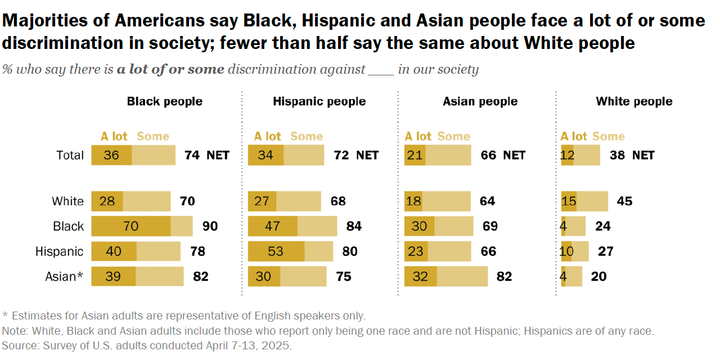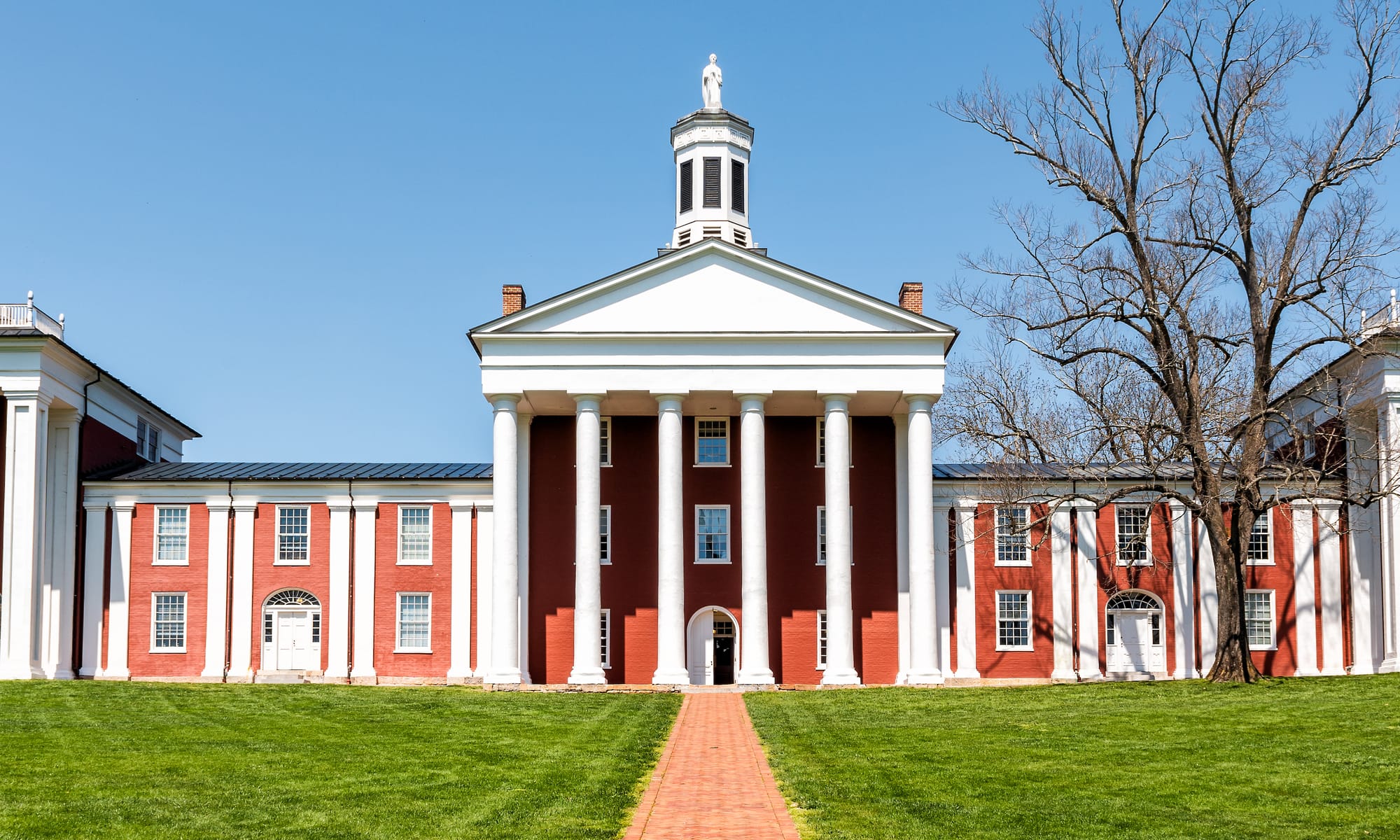Racism endures
Despite what we've been told, discrimination dangerously across social groups. And this PEW report summarizes what Americans think of it.

A comprehensive new survey from the Pew Research Center reveals the enduring reality of discrimination in American society. Majorities of Americans acknowledge that numerous groups face significant bias. The study, conducted in April 2025 among 3,589 U.S. adults, paints a sobering picture of how discrimination continues to affect multiple communities in this country. It cuts across racial, ethnic, religious, and other demographic lines.
The scope of pereceived discrimination
The findings demonstrate Americans discriminatin viewed as a pervasive issue. They see it affecting a wide range of groups. At the top of Americans' concerns are immigrants in the country "illegally." 82% of respondents say this group faces at least some discrimination—including 57% who believe they experience "a lot" of discrimination.
The data also reveals troubling patterns for racial and ethnic minorities. Three-quarters of Americans (74%) say Black people face discrimination, while 72% say the same about Hispanic people. The study also shows that residents think Asian Americans also face a significant bias. 66% of respondents acknowledge discrimination against this group.
Beyond racial categories, the survey exposes discrimination concerns across many identities. Religious minorities face particular challenges. 74% of Americans say Muslims experience discrimination, and 72% say the same about Jews.
The LGBTQ+ community also confronts substantial bias. 77% acknowledge discrimination against transgender people, and 70% recognize it against gay and lesbian individuals.
Persistent and real bias against communities of color
The research data underscore that racism remains a defining feature of American society. While some may point to legal progress or changing attitudes, the survey reveals that discrimination against racial and ethnic minorities is widely recognized as an ongoing problem.
Because it is an ongoing problem. Systemic racism is real, and the curent lot have gutted the protections we fought decades to acquire.
Particularly striking is how Americans of different racial backgrounds perceive discrimination differently. Black adults are far more likely than others to recognize the severity of anti-Black discrimination—70% of Black respondents say Black people face "a lot" of discrimination, compared to just 28% of White adults. This disparity in perception itself reflects the ongoing challenge of racial understanding in America.
The persistence of anti-Hispanic bias is equally concerning. Hispanics represent the fastest-growing demographic group in the United States. That nearly three-quarters of Americans acknowledge discrimination against this community signals serious immigration and integration challenges ahead. People are not inherently illegal. We all where, at one time, new to these shores. We'd be wise to remember that, despite the entitlement built for some of us on the backs of those dragged here unwillingly.
Two-thirds of Americans recognize discrimination againt Asian Americans—a "model minority." are recognized by t. This acknowledgment contradicts those narratives from the right. Those seek to minimize or dismiss these real challenges Asian American communities face. And Blacks. And Hispanics. And LGBTQ people. And other immigrant groups (save white South Africans, hmmmmm.)
The partisan divide on discrimination
Perhaps most alarming is how political affiliation shapes Americans' willingness to acknowledge discrimination—a pattern that may hinder efforts to address bias effectively. The Pew Research Center found stark differences between Republicans and Democrats in recognizing discrimination against most groups.
Republicans are significantly less likely than Democrats to acknowledge discrimination against racial minorities. Only 54% of Republicans say Black people face discrimination, compared to 94% of Democrats. Similar gaps exist for Hispanic people (54% vs. 90%) and Asian people (51% vs. 83%).
This partisan divide extends beyond race. Republicans are less likely to recognize discrimination against immigrants, LGBTQ+ individuals, and women. However, Republicans are more likely than Democrats to see discrimination against White people, evangelical Christians, men, and religious people generally. Places where no discrimination effectively exists, other than as an anti-"woke" cudgel to score political point.
This polarization suggests that efforts to address bias may themselves become partisan issues. This would make meaningful progress almost impossible.
Declining recognition of discrimination trends
Discrimination persists, this study found that Americans have become less likely to acknowledge it over the past year. This is primarily driven by changing Republican attitudes, while Democratic views have remained relatively stable. They are more allowed to show their true colors in public.
Between 2024 and 2025, the numbers of Republicans acknowledging discrimination dropped by roughly 10 percentage points for Black people (from 66% to 54%), Hispanic people (from 66% to 54%), and Asian people (from 66% to 51%.
This declining recognition of discrimination doesn't reflect actual improvements in discriminatory treatment. Instead, it may indicate growing political resistance to acknowledging bias or changing media narratives that downplay discrimination. So it is likely being under-reported or ignored.
The trend extends to religious groups as well. Americans are now less likely to say Muslims and Jews face discrimination than they were a year ago. The recognition of anti-Muslim discrimination fell to its lowest point in eight years of Pew tracking.
Gender and other forms of bias
The survey also reveals that discrimination extends well beyond race and religion. Gender-based discrimination remains a significant concern. 64% of Americans say women face at least some discrimination, compared to just 34% who say the same about men.
These perceptions also swing dramatically by political affiliation and gender. Democratic women are most likely to recognize discrimination against women (85%), while Republican men are least likely (38%). Conversely, Republican men are most likely to say men face discrimination (51%).
Americans also recognize age-based discrimination59 % of Americans acknowledge bias. Compare this to bias for younger people (40%). Geographic discrimination is perceived as affecting rural residents (41%) more than city dwellers (33%).
The oldest bias is religious bias
Religious discrimination remains a significant concern across faiths. Pew found that most Americans acknowledge discrimination against Muslims (74%) and Jews (72%). Bit it also states the obvious. Fewer recognize bias against evangelical Christians (43%) and—strangely—atheists (33%).
The recognition of anti-Jewish discrimination has fluctuated significantly in recent years, reflecting changing social and political dynamics. While it declined from 2024 to 2025, it remains higher than it was from 2017 to 2021.
The study doens't make it clear how they described anti-Jewish discrimination as precisely as I would have liked. We cannot conflate anti-Zionism and anti-Israel with anti-semitism.
Implications and ramifications
The Pew Research Center's findings reveal a complex landscape where discrimination is widely acknowledged yet increasingly politicized. The data suggests several troubling realities:
- First, discrimination remains pervasive across multiple demographic categories, with racial and ethnic minorities, religious groups, immigrants, and LGBTQ+ individuals all facing significant bias. And we recognize this to some extent.
- Second, Americans' ability to recognize discrimination is increasingly shaped by political affiliation. This will hamper efforts to build consensus around addressing bias.
- Third, recognition of discrimination appears to be declining. This is particularly among Republicans, even as the underlying conditions that create discriminatory treatment may persist.
The survey results underscore that racism and other forms of discrimination are not historical artifacts but ongoing realities that require sustained attention and action.
That majorities acknowledged that discrimination exists is heartening. It could even provide a foundation for progress, but the right wing will block it at every turn.
Moving forward, addressing discrimination will require not only policy interventions but also efforts to bridge the perception gaps that prevent Americans from building consensus around these challenges. In short, it will require a new government from top to bottom.
Non in cautus futuri.

